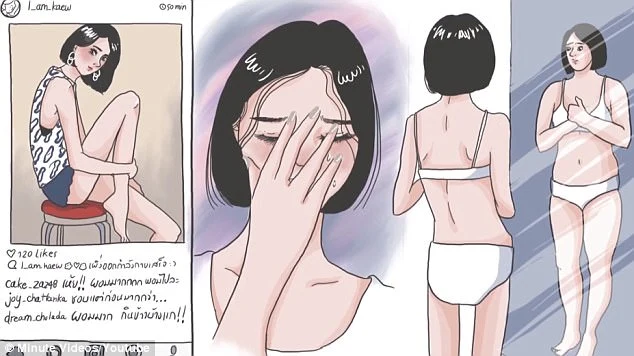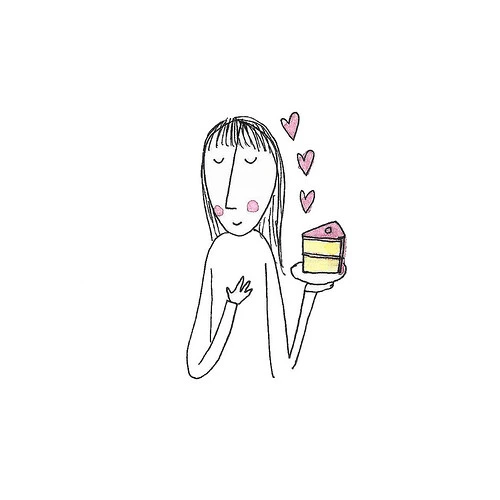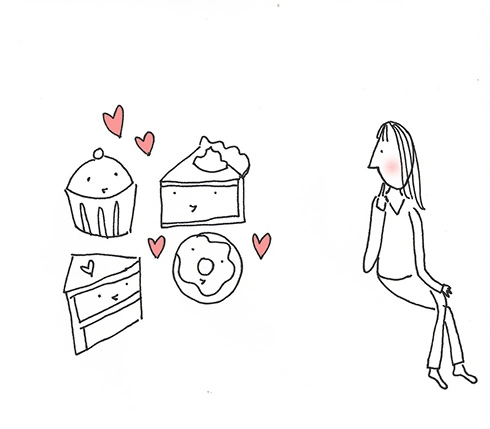
My Eating disorder spanned over 10 years bouncing back and forth between restricting food, purging, orthorexia, over exercising, yo-yo dieting, binge eating and emotional eating. But no matter what was going on inside me – it was never seen by the outside world. Most people would say that I looked fine and “good”. There was nothing for me to worry about.
Eating disorder is a mental illness and it is a silent illness. It is quiet and sneaks up on you without you even noticing it until it is holding its grip on you. It often starts with good intentions like wanting to be healthy, eating well and exercise more. And then one day you are noticing that it is now obsessive and compulsive behaviour and has become a routine that seems to me impossible to step out of.
Since my recovery, I have made it my mission to help others with eating disorders and disordered eating. In this blog, I wanted to share what has helped me and my clients. It is a compilation of tips and steps which may help you to recover or in the progress to recovery.
Having an educated support network
Suggest to those that want to help you to research recovery so that they can better understand what an eating disorder is and what you are experiencing. When people that are closest to you are able to educate themselves on what they need to do to support you, they can better learn how to communicate with you. As a sufferer, you will most likely be very sensitive to comments about food and weight etc even if those comments are said with good intentions. It is helpful if your friends and family know what to say to you whilst you are recovering and particularly what not to say! You can explain to them that a compassionate, calming and confident attitude can help a lot instead of being judgmental or giving rational facts or even advice.
“Eating disorder is not a will power issue or attention seeking, nor is it that easy to overcome” – client

Find something you are passionate about
I believe that a big part of my recovery was my back then newly discovered passion for yoga and dancing. That way I was able to focus on my expression through dance and yoga instead of my look, body image, food and the control of all of that. Change the focus from body hatred to seeing the abilities of my body to dance, move, open up, explore, become stronger and flexible was fascinating and beautiful.
I was able to feel more confident and found a voice though movement.
Part of the work that I do with clients is finding their passion, they values and what is truly important to them. Often, and eating disorder becomes an identity, so together, we create a new identity, one that is showing the true beauty of the person – one that feel proud of and the one that makes them happy from inside out.
Having supportive friends/family
Utilise those around you who care about you and support you no matter what. The love and support they can offer is valuable to you during your recovery. You want to surround yourself with people who you can talk to and who will listen without judgement – this is vital.
Some of my clients have had great friends or partners who were able to show them fun ways of eating or who were simply there for them if they needed someone to eat with (in times when they felt like they didn’t want to eat). Try find ways to make eating food fun and include your partner or friends to help you too. For some of my clients this was exploring new foods together.
Letting your body find its natural weight
A big problem in recovery is not eating enough and only getting to a “healthy BMI”. In order to recover completely, you need to let your body find its natural weight again – something that is different for everyone. Stop counting calories and start eating anything you crave whenever you feel like it.
Please know that there will be a lot of thoughts, doubt and questions. As soon as you start overthinking, remember that it is the “Eating Disorder Voice” not yours. Remind yourself that thinking about calories, how much you are eating or if you aren’t exercising doesn’t bring you closer to the your recovery – only further away. Give yourself permission to listen to what your body wants. Listen with kindness, love and compassion. I quite like to think about a child and always think about how I would listen to a child. What would I give to them if they asked. You are that child – inside, you are still the little girl who wants love, connection and affection. Give that to yourself as much as the little girl/boy inside of you needs.

Changing your environment – including unfollowing social media accounts
For most of my clients this involves unfollowing social media accounts that feed their eating disorder, such as accounts that promote being thin or the classic beauty standard. Instead follow inspirational accounts that promote self-love or being fit and healthy at any shape or weight etc. There are so many social media accounts that provide support and community for people struggling with eating disorders.
For me, ‘changing my environment’ involved ending a toxic relationship and quitting a job I was not happy in. This will be different for everyone as we all have different triggers that cause our eating disorder. Eliminate the things in your environment that are triggering your eating disorder or a toxic for your mental health.
Commit to recovery!
Don’t wait! As soon as you commit to seek help, the sooner you give yourself the chance to recover. Remember that you will probably never feel ready, you might never have all recovery figured out. Seeking support is a big key. Part of the process will be taking slow and small actions towards recovery. All my clients who made a personal commitment to recover have been successful. Everyones experience with recovery is different and everyone recovers using different methods. These ways can and will help but finding what works for you is key.
“I started eating enough food (regular meals and all kind of foods) and I let myself mentally look forward to a recovered life which at that point seemed impossible.” – client
“I started eating enough food (calorie wise), I ate foods I feared and usually avoided, I followed recovery instagram accounts, I stopped tracking my calorie intake, I stopped working out and I read body positivity posts” – client
Honour your hungers and cravings, try not to overthink the process. There are three pillars to recovery: Nutrition, Physical and Emotional. All of them are as important as each other.
“I think eating enough food and gaining weight has been the most helpful thing in recovery because just by doing that a lot of things started changing. I do believe any mental work on a deeper level that I did helped me to achieve that.” – client
If you or someone you know is experiencing fear of food and body obsession or even an eating disorder, please feel welcome to contact me to find out how I can support you or your loved one.
If you are interested to hear more about my personal story, read more HERE



